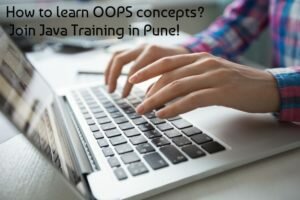OOPS
Join the advanced Java Training in Pune and get to know OOPS concepts in detail.

Objects are considered an important aspect of the Object Oriented Programming concept. The objects can be created as per the user’s choice which will, in turn, be used for accessing the objects. In modern programming concepts like Java, OOPS is widely used.
Core OOPS concepts are
1) Class
Similar attributes together constitute a class. It is regarded as a logical component and not the physical entity. For instance, if you have a class named Employee details then it will contain details like employee name, id, profile, address, number etc. The methods in this class would be like HR, Sales, Manager, etc.
2) Object
An instance of a class is termed as an object and there are lots of instances of a class in the program. Both the data and the function is present in the object which uses the data.
3) Inheritance
When an object acquires the properties and behaviors of the parent object then it is called as Inheritance. It is very useful in organizing and structuring any software.
4) Polymorphism
The ability of a variable, object or function to create various forms of itself is referred to as a polymorphism. For instance, the word train would provide a different meaning while boarding the train when compared to undergoing training. Polymorphism follows the same concept.
5) Abstraction
Important features are represented without mentioning background details which are actually termed as an abstraction. A new data type is created with this technique which is suited for a particular application.
6) Encapsulation
The data and the code is wrapped together which is termed as Encapsulation. The variables of a class are hidden from other classes. Only the current class methods can actually make use of such variables.
7) Association
Two objects are actually associated with each other if the objects between the classes are diversified. For example, many students can be associated with a single professor and one single professor can be associated with multiple teachers.
8) Aggregation
One child object cannot be imported by another parent object in this technique.
9) Composition
It is a completely reliable relationship where a child object dies when the parent object is deleted completely.
Advantages of OOPS:
- Can be understood easily with a clear modular structure for programs
- Objects created are reusable.
- OOPS, the concept makes it easy to design with minimum flaws.
After completing the Java course you can get lots of Java Jobs in Nagpur.
You can also read: Core Java Programming Language Course
